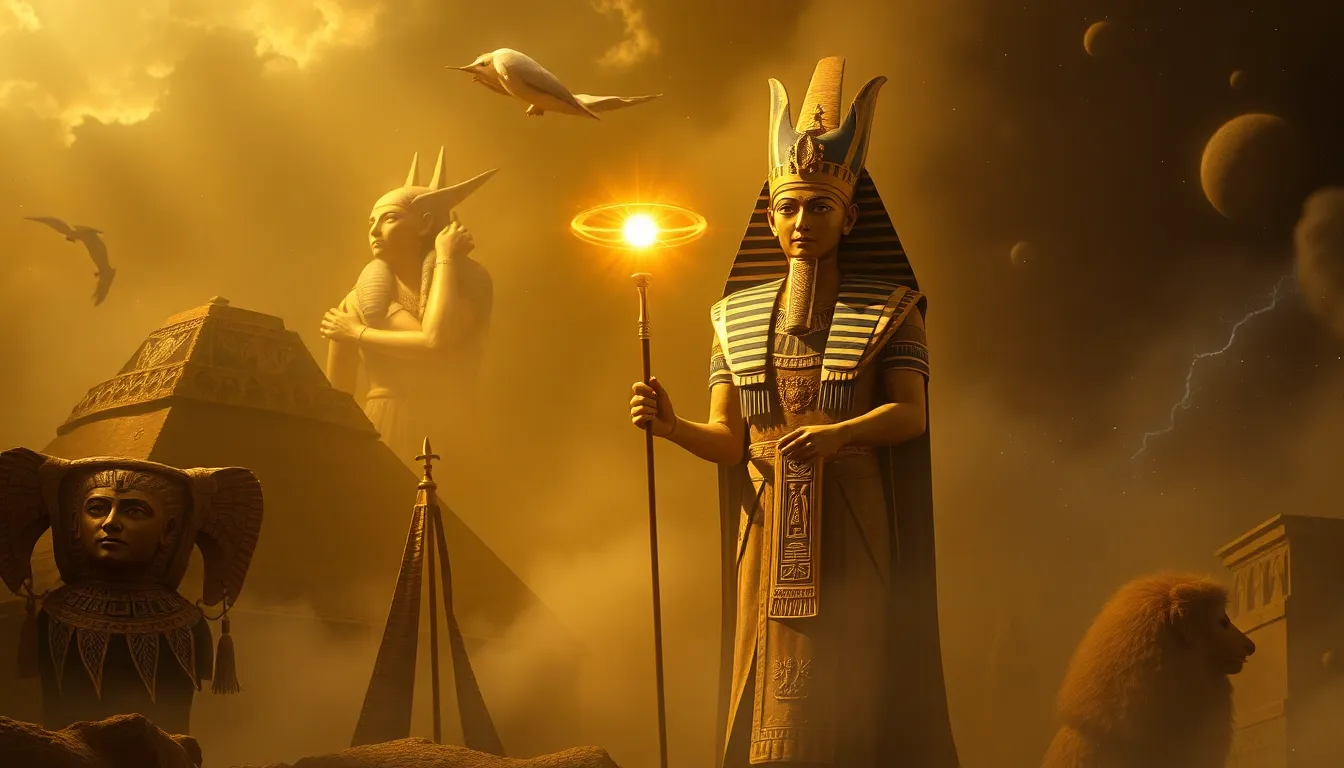The Divine Kingship of Merneptah: A Time of Trials
I. Introduction
Merneptah, the fourth pharaoh of the Nineteenth Dynasty of Egypt, ruled from 1213 to 1203 BCE. His reign marked a significant period in Ancient Egyptian history, characterized by both external conflicts and internal challenges. As a ruler, Merneptah was deeply entwined with the concept of divine kingship, which held that the pharaoh was a god on earth responsible for maintaining ma’at, or cosmic order.
This article aims to explore the trials faced by Merneptah during his rule, emphasizing the historical context, foreign invasions, internal strife, religious shifts, military campaigns, and his lasting legacy.
II. Historical Context of Merneptah’s Ascendancy
Merneptah was the son of Ramses II, one of Egypt’s most celebrated pharaohs. His ascension to the throne came after a long period of stability and prosperity, but it was also a time of underlying tensions.
- Merneptah’s lineage: As Ramses II’s son, he was expected to inherit a powerful kingdom.
- Political landscape: Before Merneptah, Egypt enjoyed a lengthy period of prosperity, but the latter years of Ramses II’s reign saw increasing challenges, including resource depletion and external threats.
- Divine kingship: Merneptah’s legitimacy as a ruler was heavily reliant on the divine kingship ideology, which positioned him as the intermediary between the gods and the people.
III. The Challenges of Foreign Invasions
Merneptah’s reign was marked by significant external threats, particularly from neighboring peoples and nations.
One of the most pressing challenges came from the Libyans, who began to encroach upon Egyptian territory. The Battle of Perire, which occurred during his reign, was a pivotal moment in this conflict.
- External threats: The Sea Peoples and the Libyans posed significant military threats to the stability of Egypt.
- Battle of Perire: A key encounter where Merneptah successfully defended his kingdom against invading forces, showcasing his military prowess.
- Impact on authority: Despite his victories, the constant threat of invasion undermined Merneptah’s authority and the stability of his reign.
IV. Internal Strife and Succession Issues
While facing external threats, Merneptah also grappled with political instability within the royal court.
- Political instability: The succession of power became a contentious issue, with various factions vying for influence.
- Relationship with sons: Merneptah’s relationship with his sons, particularly with potential heirs, was fraught with tension and rivalry.
- Internal conflicts: These conflicts not only distracted from the external threats but also weakened the overall governance of Egypt during his reign.
V. Religious and Cultural Trials
The reign of Merneptah also witnessed significant shifts in religious practices and cultural expressions.
- Shifts in religious practices: The worship of certain deities became more pronounced, reflecting the changing dynamics of Egyptian spirituality.
- Role of the priesthood: The priests gained considerable influence, often challenging the authority of the pharaoh.
- Cultural expressions: Despite the trials faced, art and literature flourished, often depicting the divine attributes of kingship amidst adversity.
VI. Military Campaigns and Their Consequences
Merneptah’s military campaigns were a defining aspect of his reign, particularly his engagements with the Sea Peoples.
- Overview of military campaigns: Merneptah launched several military expeditions to defend and expand Egypt’s borders.
- Victory over the Sea Peoples: His famous victory at the Battle of the Delta was a significant achievement, bolstering his reputation as a powerful ruler.
- Long-term effects: These military actions had lasting consequences for Egyptian society, including shifts in military strategy and resource allocation.
VII. Legacy and Historical Interpretations
The trials faced by Merneptah during his reign greatly influenced his legacy and how historians interpret his rule.
- Shaping his legacy: The challenges he faced, both internally and externally, cultivated a complex legacy that was both respected and scrutinized.
- Historians’ interpretations: Modern historians and archaeologists have debated the effectiveness of his rule, often contrasting his military successes with the instability he faced.
- Merneptah Stele: The stele, which contains one of the earliest references to Israel, offers critical insights into the socio-political landscape of the time.
VIII. Conclusion
Merneptah’s reign was marked by trials that tested his resolve as a ruler and the principle of divine kingship. Despite facing significant foreign invasions, internal strife, and shifts in religious practices, he managed to leave a complex legacy. His ability to navigate these challenges provides insight into the resilience of Egyptian kingship amidst adversity.
Ultimately, the enduring impact of Merneptah’s reign can be seen in the trajectory of subsequent Egyptian history, where the lessons learned during his rule informed future generations of leaders.




